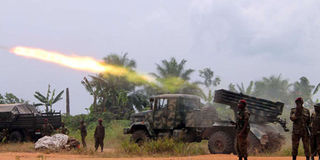Prime
How wars are derailing Africa’s progress

Congolese troops FARDC throws a missile during a fight against rebels of ADF-Nalu, a Ugandan Islamist group which has been based on the Congolese side of the border. FILE PHOTO | AFP
What you need to know:
“The growing violence in African countries has led to huge loss of life and exacerbated urban problems."
Author and journalist Fareed Zakaria once observed that, today, “The richest countries of the world are not in geopolitical competition with one another, fighting wars, proxy wars, or even engaging in arms races or cold wars…You would have to go back hundreds of years to find a similar period of great power peace”.
According to Zakaria, the number of people who have died as a result of war (in the developed nations) is down 50 per cent this decade from the 1990s and it is down 75 per cent from the preceding five decades. In fact, it is said that these countries are living in the most peaceful times in human history.
The political stability experienced in the developed world has allowed the creation of a strong economic system, which has enabled them to flourish and grow immeasurably. For instance, today, the average Chinese person is 10 times richer than he or she was 50 years ago.
In Africa, on the other hand, armed conflicts and civil wars continue to be the order of the day and are only getting worse. An analysis of the most relevant events revealed that in 2021, there were at least 20 African countries with active armed conflicts. And as a result, more than 25,000 Africans were brutally killed, an almost ten-fold increase from a decade ago.
The growing violence and military tensions in African countries such as Ethiopia, Sudan, DR Congo, Libya and Mali, have led to huge loss of life, exacerbated urban problems, derailed social progress and are locking these countries into a downward spiral of intergenerational poverty.
We need to understand this: When guns become a national obsession, all the social and developmental needs become a luxury. Former US President John F Kennedy said on one occasion that: “Mankind must put an end to war, or war will put an end to mankind.”
And in my opinion, much of the armed conflict and violence in a significant number of African countries is driven by competition for resources, corruption, weak governance and a failure to manage the resultant ethnic diversity, as well as to build a common national identity.
Yes, I am aware that the African Union (AU) has made a number of efforts in the past to avert this problem but most of them have failed miserably. Take the example of the “Silencing the Guns in Africa by 2020” project adopted by the AU in 2013.
The initiative was intended to achieve a conflict-free Africa, prevent genocide, make peace a reality for all and rid the continent of wars, violent conflicts, human rights violations, and humanitarian disasters. The leaders hoped to have all the guns silenced by 2020.
Obviously, instead of improving, the situation got worse as 2020 saw the unfortunate return of military coups in Africa after a long while and failure by the AU to effectively intervene has further cast the organisation’s credibility in further disarray.
But contrary to what former drug lord Pablo Escobar said, not all empires are created of blood and fire, especially in the modern world. A military siege is always expensive, costs both lives, time, energy and money. And with every battle we grower weaker.
In the words of Martin Luther King: “Why can’t we at long last grow up, and take off our blindfolds, chart new courses, put our hands to the rudder and set sail for the distant destination, the port city of peace?”. If we assume that life is worth living and that man has a right to survive, then we must find an alternative to war.
Mr Brian Mukalazi is the country director of Every Child Ministries [email protected]




